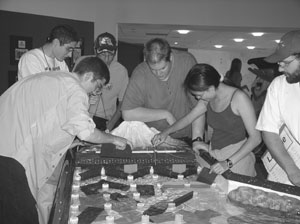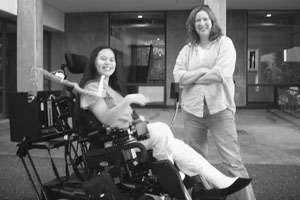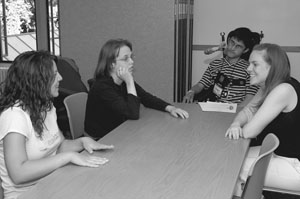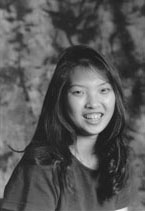Chapter 7: Lessons Learned

A total of 281 students with disabilities participated in the DO-IT Scholars program between 1993 and 2006. Of the 245 Scholars who have graduated from high school, about 90% are currently attending or have attended college. Sixty-three Scholars have graduated from college, and eight are enrolled in or have completed graduate school. Scholars' fields of study and employment include business, mathematics, biology, chemistry, computer science, ecology, engineering, nutritional sciences, pediatric psychiatry, physical therapy, physics, pre-medicine, and speech and hearing sciences. One Scholar who is blind completed degrees in mathematics and computer science and studied as a Rhodes Scholar at Oxford. Scholars have earned master's degrees in such fields as physical therapy and audiology.
Many surveys, interviews, focus groups, and observations suggest the efficacy of DO-IT practices and inform staff as they improve and expand program offerings (e.g., Burgstahler, 2003a, 2003c; Burgstahler & Bellman, 2005; Burgstahler & Cronheim, 2001; Burgstahler, Lopez, & Bellman, 2004; Kim-Rupnow & Burgstahler, 2004). Some of the results of research activities can be found by selecting research from the DO-IT home page. In addition, the progress of more than one hundred participants is being tracked as part of a longitudinal study of the impact of specific interventions.
When DO-IT Scholars were surveyed to determine the long-term impact of key program components, respondents reported growth in their level of preparation for college and employment and their self-advocacy skills. One Scholar reflected that participation in DO-IT "helped me to understand more about myself and the people in the real world. I have learned how to adapt to society without thinking that I am disabled, that I am useless." Another said, "I'm less shy now that I know there are more people out there that are just like me!" Others reported that DO-IT helped them keep their expectations high (Kim-Rupnow & Burgstahler, 2004). Scholars rank computer and Internet skills as the most valuable skills gained from DO-IT for supporting their academic and career goals. One Scholar reported, "I learned that I could really use computers effectively." Another Scholar stated, "The technology really helped me at the time because there was no way I could afford a computer then." Another summarized, "DO-IT has shown me that information is empowerment and that through computer and social networking there is virtually free access to information for everyone." Parents and Scholars both ranked computer and Internet activities of highest value, followed by academic skills and then social skills, in preparing for careers (Burgstahler, 2002b, 2003a; Burgstahler & Kim-Rupnow, 2004).

When parents were asked to what degree participation in DO-IT activities enhanced their children's lives, their responses were, in descending order, interest in college, perception of career options, self-esteem, and self-advocacy skills (Burgstahler, 2002b). As summarized by one parent,"My son has benefited greatly from the DO-IT program. He was able to realize that many other students had to struggle through school. DO-IT camps allowed students to bond, and the computer networking allowed them to continue to support each other through the year. He did not dwell much on the future until he attended DO-IT Camp. He came home talking about his college plans with confidence that he could manage them. DO-IT has also helped my son get a part-time job during his first year of college É he has achieved a level of independence we never thought possible."
When parents were asked to rank which skills the DO-IT Summer Study program developed in their children, they ranked social skills highest, followed by career/employment skills, and academic skills (Burgstahler, 2002c). When Scholars were asked which specific skills the DO-IT Summer Study program helped them develop, they rated social skills highest, followed by academic skills and then career/employment skills (Burgstahler & Kim-Rupnow, 2004). When they were asked what Summer Study experiences were most valuable for their personal, academic, and career development, computer and Internet use was a clear leader, followed by activities related to college preparation, development of personal relationships, and career skills. One participant said, "I'm É learning skills needed to succeed in college." Another reported, "I learned how to advocate for myself."
Key Program Components
In summary, to help young people with disabilities transition to college and careers, DO-IT outcomes suggest that the following program offerings should be considered (Burgstahler, 2003a).
Computer and Internet Access
Give students with disabilities access to computers, assistive technology, electronic communication, and Internet resources at an early age. Make sure computing resources in schools, such as computer labs and educational software, are accessible to students with disabilities.
Peer Support
Help connect college-capable youth with disabilities with other teens who have disabilities. Encourage relationships among students with a wide variety of disabilities; these connections can help them understand their own challenges and solutions and gain insights into the potential and the accommodation needs of others. Being more aware of challenges faced by other people can help them become leaders and mentors to others.

Mentor Support
Create situations in which young people with disabilities can gain access to role models who have disabilities and are successful in challenging careers. Promote mentoring relationships between young people and adults with disabilities. Use the Internet to sustain these relationships.
College Preparation
Have students visit college campuses, learn about resources, and become experts on the assistive technology and other accommodations they need before the end of their high school years. Offer programs that bridge the gap between high school and college, between two-year and four-year schools, and between undergraduate and graduate studies. Encourage them to take high school courses, such as math and science, that will maximize their options for academic majors when they go to college.
Work-Based Learning
Provide opportunities for young people to participate in paid and unpaid work experiences. Through internships, job shadows, volunteer work, and other work-based learning experiences, they can prepare for future employment, learn how to self-advocate for accommodations, and practice job-related skills. Seeing their potential for careers will also motivate them to succeed in school (Burgstahler, 2002b).
Sample Documents
As indicated by the preceding paragraphs, DO-IT has undergone many evaluation/research activities. Consult the following Appendices for a few samples of forms that other programs might find useful. Contact the DO-IT Director at sherylb@u.washington.edu for information about other research/evaluation instruments and procedures.
- Appendix I: Online Mentor Survey
- Appendix J: Participant Computer and Internet Use Survey
- Appendix R: Summer Study Participant Evaluation
- Appendix S: Faculty/Instructor Feedback
- Appendix U: Work Experience Survey
- Appendix V: Parent Feedback
Conclusion
We hope that these materials and resources assist you on your journey as you help students with disabilities prepare for challenging academic programs and careers.
One Success Story An interview with DO-IT Ambassador Jodi
 Jodi was a 1996 DO-IT Scholar who is now pursuing her Ph.D. in genetics at the University of Iowa. Jodi took a few moments to reflect on how she became involved with the DO-IT Scholars program and on aspects of the program that influenced her academic and career development.
Jodi was a 1996 DO-IT Scholar who is now pursuing her Ph.D. in genetics at the University of Iowa. Jodi took a few moments to reflect on how she became involved with the DO-IT Scholars program and on aspects of the program that influenced her academic and career development.
Interviewer: Tell me about what you are doing now and what led you down this career/academic path.
Jodi: I am currently a graduate student in Genetics at Iowa State University. In broad terms, my responsibilities include attending class, writing and publishing journal articles, designing and carrying out experiments, helping other graduate students, teaching undergraduate classes, and going to conferences to share my work with other scientists. I was always interested in science, but my interest in genetics surged after I completed Phase II of the DO-IT Scholars program. When I started college, I did some research as an undergraduate and I fell in love with the discipline.
Interviewer: Describe some important lessons and experiences from the DO-IT Scholars program that stayed with you over time.
Jodi: The most important lesson that I learned from DO-IT is to build a good support system for yourself—at school, at work, and at home. There are a lot of people out there who want to see you succeed, and they will help you any way they can. The trick is to find them and ask for help when you need it.
Interviewer: What led you to the DO-IT Scholars program back in high school?
Jodi: My algebra teacher thought that I'd be a good candidate for the program.
Interviewer: Did the Scholars program or people you met (mentors, instructors, etc.) impact your college or career choice in any way?
Jodi: The DO-IT program had a lot of impact on why I chose the field of genetics. I had to do a short genetics experiment as a Phase II Scholar, and I've been hooked ever since.
Interviewer: What were the most valuable components of the Scholars program—mentoring, friendships, technology, college/career preparation?
Jodi: DO-IT wouldn't have the impact it has without all of its components. However, if I was forced to choose something, I would say that it's technology. Of course in today's society, technology is essential for everyone, but I think for minorities and people with disabilities, it is so much more than that. It takes away all prejudices and provides a level playing field in which we are judged only by our words and actions.
Interviewer: What are the factors you learned early on as a student or employee that have contributed to your current success?
Jodi: Probably the most important advice I ever got was to always be my own advocate, set high standards for myself, and rise to the occasion. I think in life you have to get to know yourself more than anybody else.
Interviewer: What was your most memorable Summer Study experience as a Scholar?
Jodi: It was nice to meet other students with disabilities who share similar interests and goals. They have opened up my world in so many ways. I would say that I am much more aware of various kinds of disabilities out there since DO-IT.